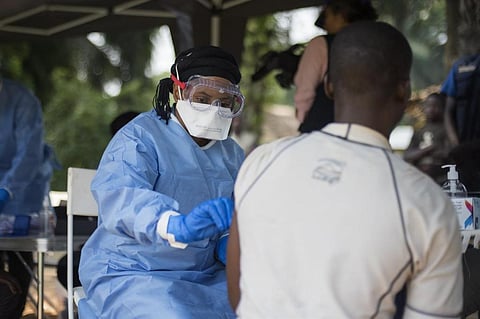

Health authorities in the Democratic Republic of the Congo are looking into a suspected case of Ebola virus disease in the eastern province of North Kivu.
The country’s National Institute of Biomedical Research is analysing sample data to ascertain whether the patient had Ebola.
A 46-year-old woman who passed away August 15, 2022, in the North Kivu town of Beni is the suspected case. The patient was initially treated at the Beni Referral Hospital for different conditions but later developed symptoms of the Ebola virus.
“While the analysis is ongoing, WHO is already on-the-ground supporting health officials to investigate the case and prepare for a possible outbreak,” said Dr Matshidiso Moeti, the WHO regional director for Africa, in a press release.
The WHO August 19 had published its first guideline for Ebola virus disease therapeutics, emphasising the use of two monoclonal antibodies.
The antibodies mAb114 and REGN-EB3 have demonstrated clear benefits for people who have tested positive for Ebola.
The WHO urged the global community to improve access to these lifesaving medications.
Ebola is a severe and too often fatal illness caused by the Ebola virus. In previous outbreaks, it has killed as many as 90 per cent of the people it infected, according to the WHO.
The virus is transmitted to people from wild animals and spreads through human-to-human transmission.
Early identification, treatment and care with the best supportive care — including hydration and electrolyte replacement and symptom therapy — have greatly improved survival in previous Ebola outbreaks and responses.
The new guidance will benefit healthcare professionals treating Ebola patients and policymakers involved in outbreak preparedness and response.
“From now on, people infected with the Ebola virus will have a greater chance of recovering if they seek care as early as possible. As with other infectious diseases, timeliness is key,” Dr Richard Kojan, co-chair of the expert group selected by the WHO to develop the guidelines, told UN News.
People should not hesitate to consult health workers as quickly as possible to ensure they receive the best care possible, he added.
The recommendation comes from an analysis of clinical trials for the monoclonal antibodies on those who have tested positive for Ebola.
These antibodies have demonstrated clear benefits for patients.
Clinical trials were conducted on older persons, pregnant and breastfeeding women, children and newborns whose mothers were confirmed to have Ebola within the first seven days.
The UN agency said it is prepared to assist countries, suppliers and partners in enhancing access to these two medications.
“We have seen incredible advances in both the quality and safety of clinical care during Ebola outbreaks,” Dr Janet Diaz, lead of the clinical management unit in the WHO’s Health Emergencies Programme, told UN News.